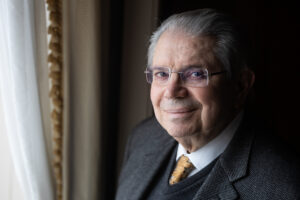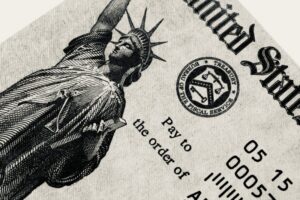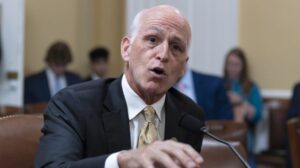The Dictatorship
This Thanksgiving, I’m actually grateful to be a Detroit Lions fan

UPDATE (Nov. 28, 2024, 4:10 p.m. ET):On Thursday afternoon, the Detroit Lions beat the Chicago Bears 23-20.
Thursday is Thanksgiving Dayand a great American tradition will be served again — the Detroit Lions will be plyeahing football. Every year, this gridiron contest has allowed Americans to come together and poke fun at one of the worst franchises in organized athletics … all the while spoiling many a Thanksgiving Day for Lions fans.
But not this year.
Win or lose on Thursday, we are living in the Lions Renaissance. It is the greatest moment ever to be a Lions fan — and we have earned it after decades of incompetence, futility, bad luck, and even worse football.
Win or lose, we are living in the Lions Renaissance.
Over the years, the Lions have found ways to lose games that other teams can only dream of — multiple Hail Marys, batted balls in the end zone, uncalled penalties, 10-second runoffs, dropped fourth-down passes, wide receivers penalized for failing to “finish the process” of a catch, and the ultimate in football futility, an 0-16 season.
Mention to a Lions fan the picked-up flag in the 2015 playoff game against the Dallas Cowboys, or Sterling Sharpe sprinting down the Pontiac Silverdome field without a Lions defender in sight in the 1995 playoffs, and you might see a grown adult enter a fetal state.
Say “1995 playoff game vs. the Philadelphia Eagles” in a Detroit bar and let the drowning of sorrows begin.
Some of us are even old enough to remember the 1983 playoff game against the San Francisco 49ers, when Eddie Murray’s game-winning kick sailed wide right — the first of many bitter playoff losses over the next four decades.
But all that changed in January 2024. In an event that I would rank just slightly below my children being born, the Lions won their first playoff game in 32 years … and then a week later, we won again. Sure, we lost the NFC Championship game after blowing a 17-point halftime lead, but not many Lions fans will complain. Last season was the best season in recent Lions history, and this year is shaping up to be even better.
By nearly every metric, the Lions are the best team in football. They are tied with the Kansas City Chiefs for the best record. Their offense is practically unstoppable, drawing comparisons to the historically great St. Louis Rams “Greatest Show on Turf” teams of the late 1990s and early 2000s. Our defense hasn’t allowed a touchdown in the last 10 quarters of play, and, for the first time, Las Vegas has Detroit as the favorite to win the Super Bowl.
But for those of us who have lived and died with this franchise for the past several decades, what’s different about this season is an emotion that Lions fans have heard of but never experienced — confidence.
Back in the old days, there was a singular expression when things started to go wrong for Detroit — Same Old Lions (SOL). We always assumed something would go wrong, and it almost always did.
Not anymore.
Same Old Lions. We always assumed something would go wrong, and it almost always did.
Indeed, the moment everything changed for me as a Lions fan came in week 6, as we faced off on the road against the undefeated Minnesota Vikings. Late in the fourth quarter, sure-handed running back David Montgomery fumbled the ball; a Vikings defender picked it up and rumbled into the end zone to give Minnesota the lead.
In the old days, this was the ultimate Same Old Lions moment — one that in the past would have sent Lions fans into crushing despair. But not in 2024.
Sure enough, our quarterback Jared Goff, whose name now rings out across the nation in sports arenas, stadiums and even airplanes as a pro-Lions chant, led us down the field with precision passing — and our kicker Jake Bates sent the game-winning field goal through the uprights for the win.
Never. In. Doubt.
Was I worried three weeks later when we trailed the Houston Texans 23-7 at halftime, arguably playing our worst game of the year?
Please. Take that SOL talk and stick it in the time capsule. I knew the Lions would come back — and of course, they did, with Bates the hero again.
For the first time as a Lions fan, I knew what it is like to cheer for a good football team. Optimism — a feeling that Lions fans had read about in books and heard whispered by fans of other teams not named the Browns, Vikings or Jets — became the watchword of Lions Nation.
Last year, at the outset of the 2023 season, I wrote a piece declaring I was “hopeful” the Lions “could” finally win a playoff game. Am I so bold as to predict a Super Bowl victory to top off this magical season? Since I know, as every sports fan does, that jinxes only apply to sporting events, I’m not willing to take that risk.
But let’s just say that come February, I expect to be sitting in the stands at the New Orleans Superdome for the Super Bowl, cheering on my favorite team — and filled with … what is that word again … oh yeah, “optimism,” that my long tortured history as a Lions fan will finally come to an end.
Michael A. Cohen is a columnist for BLN and a Senior Fellow and co-director of the Afghanistan Assumptions Project at the Center for Strategic Studies at the Fletcher School, Tufts University. He writes the political newsletter Truth and Consequences. He has been a columnist at The Boston Globe, The Guardian and Foreign Policy, and he is the author of three books, the most recent being“Clear and Present Safety: The World Has Never Been Better and Why That Matters to Americans.”
The Dictatorship
The Supreme Court’s conservative majority eyes more power for the president

WASHINGTON (AP) — Chief Justice John Roberts has led the Supreme Court ‘s conservative majority on a steady march of increasing the power of the presidency, starting well before Donald Trump’s time in the White House.
The justices could take the next step in a case being argued Monday that calls for a unanimous 90-year-old decision limiting executive authority to be overturned.
The court’s conservatives, liberal Justice Elena Kagan noted in September, seem to be “raring to take that action.”
They already have allowed Trump, in the opening months of the Republican’s second term, to fire almost everyone he has wanted, despite the court’s 1935 decision in Humphrey’s Executor that prohibits the president from removing the heads of independent agencies without cause.
The officials include Rebecca Slaughterwhose firing from the Federal Trade Commission is at issue in the current case, as well as officials from the National Labor Relations Board, the Merit Systems Protection Board and the Consumer Product Safety Commission.
The only officials who have so far survived efforts to remove them are Lisa Cooka Federal Reserve governor, and Shira Perlmuttera copyright official with the Library of Congress. The court already has suggested that it will view the Fed differently from other independent agencies, and Trump has said he wants her out because of allegations of mortgage fraud. Cook says she did nothing wrong.
Humphrey’s Executor has long been a target of the conservative legal movement that has embraced an expansive view of presidential power known as the unitary executive.
The case before the high court involves the same agency, the FTC, that was at issue in 1935. The justices established that presidents — Democrat Franklin D. Roosevelt at the time — could not fire the appointed leaders of the alphabet soup of federal agencies without cause.
The decision ushered in an era of powerful independent federal agencies charged with regulating labor relations, employment discrimination, the air waves and much else.
Proponents of the unitary executive theory have said the modern administrative state gets the Constitution all wrong: Federal agencies that are part of the executive branch answer to the president, and that includes the ability to fire their leaders at will.
As Justice Antonin Scalia wrote in a 1988 dissent that has taken on mythical status among conservatives, “this does not mean some of the executive power, but all of the executive power.”
Since 2010 and under Roberts’ leadership, the Supreme Court has steadily whittled away at laws restricting the president’s ability to fire people.
In 2020, Roberts wrote for the court that “the President’s removal power is the rule, not the exception” in a decision upholding Trump’s firing of the head of the Consumer Financial Protection Bureau despite job protections similar to those upheld in Humphrey’s case.
In the 2024 immunity decision that spared Trump from being prosecuted for his efforts to overturn the 2020 election results, Roberts included the power to fire among the president’s “conclusive and preclusive” powers that Congress lacks the authority to restrict.
But according to legal historians and even a prominent proponent of the originalism approach to interpreting the Constitution that is favored by conservatives, Roberts may be wrong about the history underpinning the unitary executive.
“Both the text and the history of Article II are far more equivocal than the current Court has been suggesting,” wrote Caleb Nelson, a University of Virginia law professor who once served as a law clerk to Justice Clarence Thomas.
Jane Manners, a Fordham University law professor, said she and other historians filed briefs with the court to provide history and context about the removal power in the country’s early years that also could lead the court to revise its views. “I’m not holding my breath,” she said.
Slaughter’s lawyers embrace the historians’ arguments, telling the court that limits on Trump’s power are consistent with the Constitution and U.S. history.
The Justice Department argues Trump can fire board members for any reason as he works to carry out his agenda and that the precedent should be tossed aside.
“Humphrey’s Executor was always egregiously wrong,” Solicitor General D. John Sauer wrote.
A second question in the case could affect Cook, the Fed governor. Even if a firing turns out to be illegal, the court wants to decide whether judges have the power to reinstate someone.
Justice Neil Gorsuch wrote earlier this year that fired employees who win in court can likely get back pay, but not reinstatement.
That might affect Cook’s ability to remain in her job. The justices have seemed wary about the economic uncertainty that might result if Trump can fire the leaders of the central bank. The court will hear separate arguments in January about whether Cook can remain in her job as her court case challenging her firing proceeds.
The Dictatorship
White House hall of shame targets news outlets

NEW YORK (AP) — President Donald Trump’s White House is taking on the role of media critic and asking for help from “everyday Americans.”
The White House launched a web portal it says will spotlight bias on the part of news outlets, targeting the Boston Globe, CBS News, The Independent and The Washington Post in its first two “media offenders of the week.”
It’s the latest wrinkle in the fight against what Trump, back in his first term, labeled “fake news.” The Republican president has taken outlets like CBS News and The Wall Street Journal to court over their coverage, is fighting The Associated Press in court over media access and has moved to dismantle government-run outlets like Voice of America.
Trump has also engaged in personal attacks, last month alone saying “quiet, piggy,” to a female reporter who was questioning him on Air Force One, calling a reporter from The New York Times “ugly, both inside and out” and publicly telling an ABC News journalist she was “a terrible reporter.”
“It’s honestly overwhelming to keep up with it all and to constantly have to defend against this fake news and these attacks,” said press secretary Karoline Leavitt, who called the new web portal an attempt to hold journalists accountable.
After its debut, the White House asked for volunteers to submit their own examples of media bias. “So-called ‘journalists’ have made it impossible to identify every false or misleading story, which is why help from the American people is essential,” Trump’s press office said.
Devouring the media like hot french fries
Despite the attacks, Axios wrote this week that the mainstream media is ending the year as “dominant as ever” in capturing the president’s attention and setting Washington’s agenda, citing as one example The Washington Post’s reporting on military strikes against boats with alleged drug smugglers.
The irony is that Trump engages with reporters at a level he hasn’t seen with any other president in his lifetime, said Axios CEO Jim VandeHei, co-author of the report with Mike Allen.
“He’s always bitched about the media and the press,” VandeHei told The Associated Press. “He gobbles this stuff up like hot McDonald’s french fries. He’s a mass consumer of this. He watches it, he calls reporters, he takes calls from reporters. … That’s always been the contradiction with him.”
CBS, the Globe and The Independent were criticized for stories about Trump’s reaction to Democratic lawmakers who recorded a video reminding military members they were not required to follow unlawful orders. Trump accused the lawmakers of sedition “punishable by death.”
The White House said it was a misrepresentation to say Trump had called for their executions. The portal also said news outlets “subversively implied” that the president had issued illegal orders. The news articles they cited did not specifically say whether Trump had or had not ordered illegal activities.
Leavitt has been sharply critical of the Post’s story on Defense Secretary Pete Hegseth’s role in attacks on boats used by alleged drug smugglers in Central America. The portal this week accused the newspaper of trying to undermine anti-terrorist operations.
“Let’s be clear what’s happening here: the wrongful and intentional targeting of journalists by government officials for exercising a constitutionally protected right,” said the Post’s executive editor, Matt Murray. “The Washington Post will not be dissuaded and will continue to report rigorously and accurately in service to all of America.”
The new portal also contains an “Offender Hall of Shame” of articles it deems unfair and a leaderboard ranking outlets with the most pieces it objects to. Twenty-three outlets are represented, led by the Post’s six stories. CBS News, The New York Times and MS NOW, the network formerly known as BLN, had five apiece. No news outlets that appeal to conservatives were cited for bias.
Media watchdog welcomes the company
The conservative media watchdog Media Research Center, which has accused news outlets of having a liberal bias since 1987, welcomes the company.
“We’re pleased,” said Tim Graham, MRC’s director of media analysis. “It’s a stronger effort than Republican presidents have done before. I think all Republicans realize today that the media is on the other side and need to be identified as on the other side.”
VandeHei said about the portal, “I can’t think of anything I care less about. If they want to set up a site and point out bias, great. It’s called free speech. Do it. I don’t think it makes a damned bit of difference.”
What is damaging, VandeHei said, is a constant drumbeat of claims that what people read in the media is false. “It makes people suspicious of the truth and the country suffers when we’re not operating from some semblance of a common truth,” he said.
___
David Bauder writes about the intersection of media and entertainment for the AP. Follow him at http://x.com/dbauder and https://bsky.app/profile/dbauder.bsky.social.
The Dictatorship
Trump administration fails in latest bid to halt grants for school mental health workers

SAN FRANCISCO (AP) — A federal appeals court on Thursday rejected the Trump administration’s bid to halt an order requiring it to release millions of dollars in grants meant to address the shortage of mental health workers in schools.
The mental health program, which was funded by Congress after the 2022 school shooting in Uvalde, Texasincluded grants meant to help schools hire more counselors, psychologists and social workers, with a focus on rural and underserved areas of the country. But President Donald Trump’s administration opposed aspects of the grant programs that touched on race, saying they were harmful to students and told recipients they wouldn’t receive funding past December 2025.
U.S. District Judge Kymberly K. Evanson, ruled in October that the administration’s move to cancel school mental health grants was arbitrary and capricious.
The U.S. Department of Education and Secretary of Education Linda McMahon requested an emergency stay and on Thursday, a panel from the 9th U.S. Circuit Court of Appeals denied that motion.
The panel wrote in its decision that the government hadn’t shown it is likely to succeed based on its claims that the district court doesn’t have jurisdiction or that it will be “irreparably injured absent a stay.”
The grants were first awarded under Democratic President Joe Biden’s administration. The Education Department prioritized giving the money to applicants who showed how they would increase the number of counselors from diverse backgrounds or from communities directly served by the school district.
Stay up to date with the news and the best of AP by following our WhatsApp channel.
The Trump administration said in a statement after the ruling in October that the grants were used “to promote divisive ideologies based on race and sex.”
The preliminary ruling by Evanson, a U.S. District Court judge in Seattle, applies only to some grantees in the 16 Democratic-led states that challenged the Education Department’s decision. In Madera County, California, for example, the ruling restores roughly $3.8 million. In Marin County, California, it restores $8 million.
-

 Politics10 months ago
Politics10 months agoFormer ‘Squad’ members launching ‘Bowman and Bush’ YouTube show
-
Uncategorized1 year ago
Bob Good to step down as Freedom Caucus chair this week
-

 The Dictatorship10 months ago
The Dictatorship10 months agoPete Hegseth’s tenure at the Pentagon goes from bad to worse
-

 Politics10 months ago
Politics10 months agoBlue Light News’s Editorial Director Ryan Hutchins speaks at Blue Light News’s 2025 Governors Summit
-

 The Dictatorship10 months ago
The Dictatorship10 months agoLuigi Mangione acknowledges public support in first official statement since arrest
-

 The Josh Fourrier Show1 year ago
The Josh Fourrier Show1 year agoDOOMSDAY: Trump won, now what?
-

 Politics8 months ago
Politics8 months agoDemocrat challenging Joni Ernst: I want to ‘tear down’ party, ‘build it back up’
-

 Politics10 months ago
Politics10 months agoFormer Kentucky AG Daniel Cameron launches Senate bid











